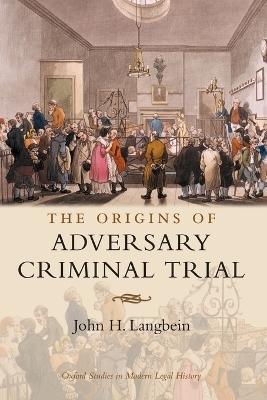
The Origins of Adversary Criminal Trial
Seiten
2005
Oxford University Press (Verlag)
978-0-19-928723-9 (ISBN)
Oxford University Press (Verlag)
978-0-19-928723-9 (ISBN)
The lawyer-dominated adversary system of criminal trial, which now typifies practice in Anglo-American legal systems, developed in England in the eighteenth century. Using hitherto unexplored sources from London's Old Bailey Court, Professor Langbein shows how and why lawyers were able to capture the trial, and he supplies a path-breaking account of the formation of the law of criminal evidence.
The adversary system of trial, the defining feature of the Anglo-American legal procedure, developed late in English legal history. For centuries defendants were forbidden to have legal counsel, and lawyers seldom appeared for the prosecution either. Trial was meant to be an occasion for the defendant to answer the charges in person.
The transformation from lawyer-free to lawyer-dominated criminal trial happened within the space of about a century, from the 1690's to the 1780's. This book explains how the lawyers captured the trial. In addition to conventional legal sources, Professor Langbein draws upon a rich vein of contemporary pamphlet accounts about trials in London's Old Bailey. The book also mines these novel sources to provide the first detailed account of the formation of the law of criminal evidence.
Responding to menacing prosecutorial initiatives (including reward-seeking thieftakers and crown witnesses induced to testify in order to save their own necks) the judges of the 1730's decided to allow the defendant to have counsel to cross-examine accusing witnesses. By restricting counsel to the work of examining and cross-examining witnesses, the judges intended that the accused would still need to respond in person to the charges against him. Professor Langbein shows how counsel manipulated the dynamics of adversary procedure to defeat the judges design, ultimately silencing the accused and transforming the very purpose of the criminal trial. Trial ceased to be an opportunity for the accused to speak, and instead became an occasion for defense counsel to test the prosecution case.
The adversary system of trial, the defining feature of the Anglo-American legal procedure, developed late in English legal history. For centuries defendants were forbidden to have legal counsel, and lawyers seldom appeared for the prosecution either. Trial was meant to be an occasion for the defendant to answer the charges in person.
The transformation from lawyer-free to lawyer-dominated criminal trial happened within the space of about a century, from the 1690's to the 1780's. This book explains how the lawyers captured the trial. In addition to conventional legal sources, Professor Langbein draws upon a rich vein of contemporary pamphlet accounts about trials in London's Old Bailey. The book also mines these novel sources to provide the first detailed account of the formation of the law of criminal evidence.
Responding to menacing prosecutorial initiatives (including reward-seeking thieftakers and crown witnesses induced to testify in order to save their own necks) the judges of the 1730's decided to allow the defendant to have counsel to cross-examine accusing witnesses. By restricting counsel to the work of examining and cross-examining witnesses, the judges intended that the accused would still need to respond in person to the charges against him. Professor Langbein shows how counsel manipulated the dynamics of adversary procedure to defeat the judges design, ultimately silencing the accused and transforming the very purpose of the criminal trial. Trial ceased to be an opportunity for the accused to speak, and instead became an occasion for defense counsel to test the prosecution case.
John H. Langbein is Sterling Professor of Law and Legal History at Yale Law School. He teaches and writes in four fields: trust and estate law, pension and employee benefit law, Anglo-American and European Legal History, and Modern Comparative Law.
Introduction ; 1. The Lawyer-Free Criminal Trial ; 2. The Treason Trials Act of 1696: The Advent of Defense ; 3. The Prosecutorial Origins of Defense Counsel ; 4. The Law of Criminal Evidence ; 5. From Altercation to Adversary Trial
| Erscheint lt. Verlag | 30.6.2005 |
|---|---|
| Reihe/Serie | Oxford Studies in Modern Legal History |
| Verlagsort | Oxford |
| Sprache | englisch |
| Maße | 156 x 233 mm |
| Gewicht | 600 g |
| Themenwelt | Geschichte ► Allgemeine Geschichte ► Neuzeit (bis 1918) |
| Geisteswissenschaften ► Geschichte ► Regional- / Ländergeschichte | |
| Recht / Steuern ► EU / Internationales Recht | |
| Recht / Steuern ► Strafrecht ► Strafverfahrensrecht | |
| ISBN-10 | 0-19-928723-6 / 0199287236 |
| ISBN-13 | 978-0-19-928723-9 / 9780199287239 |
| Zustand | Neuware |
| Haben Sie eine Frage zum Produkt? |
Mehr entdecken
aus dem Bereich
aus dem Bereich
Europa 1848/49 und der Kampf für eine neue Welt
Buch | Hardcover (2023)
DVA (Verlag)
48,00 €
Giordano Bruno - ein ketzerisches Leben
Buch | Hardcover (2024)
C.H.Beck (Verlag)
29,90 €


